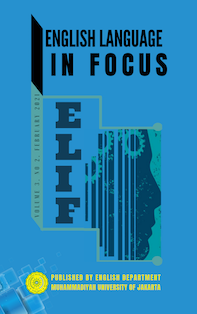Online English Education: A Paradigm Shifts in Education System and Its Challenges
DOI:
https://doi.org/10.24853/elif.3.2.119-126Keywords:
Online English Education, Online English LearningAbstract
The pandemic Covid-19 has made the world face one of the greatest challenges we have ever experienced over a century. Every sector (health industry, education, aviation, navigation, agriculture, media) is confronting such potential catastrophe that all are struggling to survive in this new normal. Due to these unavoidable trying times, there is a paradigm shift, a transition in every sphere. The education fraternity is considered the platform to build up the future generation is suffering the most because of the campus closure where other sectors are allowed to continue their activities so far. It has gone through several transformations from (traditional way of online teaching) to cope up with the situation and still struggling to reach up its goal. There was a chance for loss of the academic year if there was no online education, no transition from the traditional way of the teaching-learning process. This paper is an attempt to focus on the transition of the English teaching-learning process for the continuation of academic performances, the features of online English education, the types of online English education, the role of English teachers in this regard, strategies to make an effective online English class, challenges that we are encountering and some recommendations that are needed for the continuation of English teaching-learning performance during future trying times like epidemic, pandemic, war and so on.References
Altunay, D. (2014). Language Learning Strategies Used by Distance Learners of English: A Study with a Group of Turkish Distance Learners of EFL. Turkish Online Journal of Distance Education, 15(3), 291-305. https://doi.org/10.17718/tojde.30083
Berge, Z. (1995). Facilitating Computer Conferencing: Recommendations From the Field. Educational Technology, 35(1), 22-30.
Garrison, D. R., & Kanuka, H. (2004). Blended learning: Uncovering Its Transformative Potential in Higher Education. Internet and Higher Education, 7(2), 95–105. https://doi.org/10.1016/j.iheduc.2004.02.001
Izzah, L., & Hadi, M. S. (2018). Pembelajaran Introduction to Linguistics Melalui Vlog. Seminar Nasional Pendidikan Era Revolusi “Membangun Sinergitas Dalam Penguatan Pendidikan Karakter Pada Era IR 4.0,” 191–198. https://jurnal.umj.ac.id/index.php/SNP/article/view/2769
Izzah, L., Hadi, M. S., & Rahman, N. F. A. (2019). Engaging Learners with the Internet of Things (IoT): Gen Z’s Perspectives. Educational Initiatives Research Colloquium 2019, 150–154. https://humanities.utm.my/education/isei/
Khabbaz, M., & Najjar, R. (2015). Moodle-Based Distance Language Learning Strategies: An Evaluation of Technology in Language Classroom. International Journal of Applied Linguistics and English Literature, 4(4). https://doi.org/10.7575/aiac.ijalel.v.4n.4p.205
Makoe, M., & Shandu, T. (2018). Developing a Mobile App for Learning English Vocabulary in an Open Distance Learning Context. International Review of Research in Open and Distance Learning, 19(4). https://doi.org/10.19173/irrodl.v19i4.3746
Rossett, A. (2018). Confessions of an E-Dropout by Allison Rossett: What Went Wrong? How Would You Change the Situation? . http://edweb.sdsu.edu/people/arossett/viewpoint.htm
Subramani, P. C. N., & Iyappan, V. (2018). Innovative Methods of Teaching and Learning. Journal of Applied and Advanced Research, 3(1), 22. https://doi.org/10.21839/jaar.2018.v3is1.161
Tucker, C. R. (2020). Balance With Blended Learning: Partner With Your Students to Reimagine Learning and Reclaim Your Life (1st ed.). Corwin.
Downloads
Published
Issue
Section
License
Authors who publish with this journal agree to the following terms:
- Authors retain copyright and grant the journal right of first publication with the work simultaneously licensed under a Creative Commons Attribution License that allows others to share the work with an acknowledgment of the work's authorship and initial publication in this journal.
- Authors can enter into separate, additional contractual arrangements for the non-exclusive distribution of the journal's published version of the work (e.g., post it to an institutional repository or publish it in a book), with an acknowledgment of its initial publication in this journal.
- Authors are permitted and encouraged to post their work online (e.g., in institutional repositories or on their website) before and during the submission process, as it can lead to productive exchanges, as well as earlier and greater citation of published work (See The Effect of Open Access).


